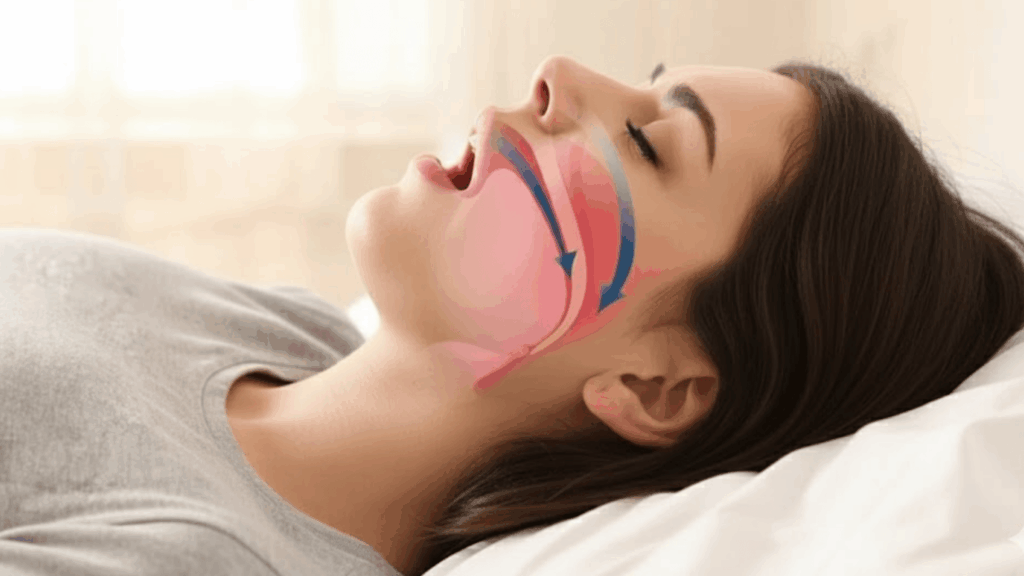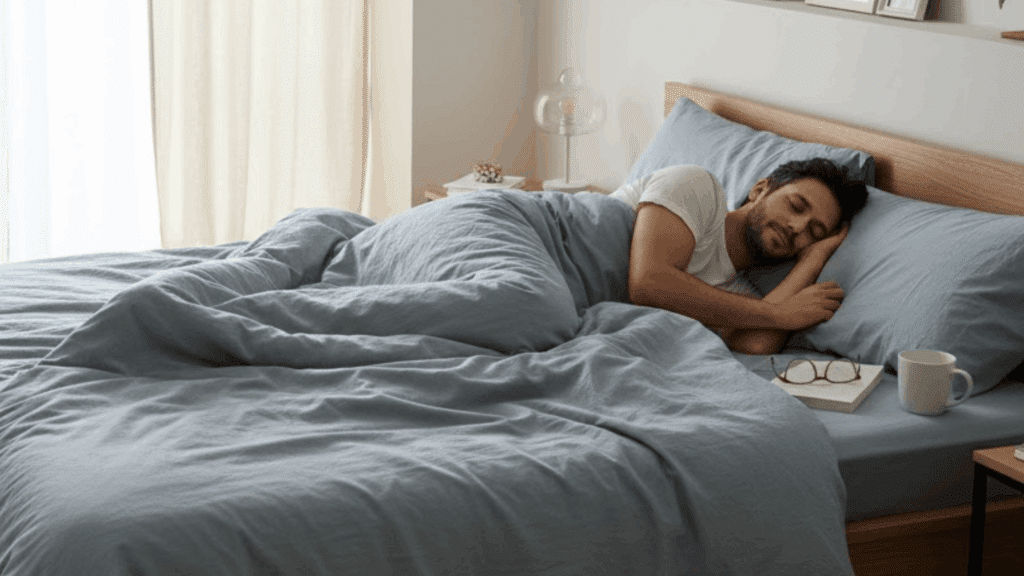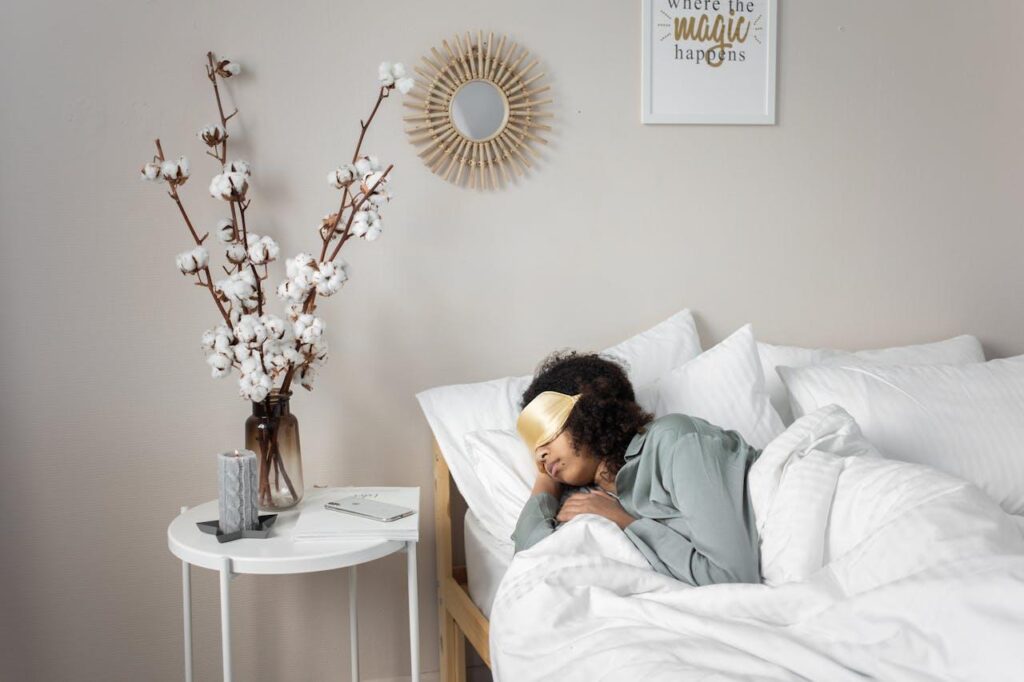Ever wake up with a dry mouth, sore throat, or a partner saying you snored all night? I’ve been there too. If you’re wondering, “why do I sleep with my mouth open?” This guide is for you.
Sleeping with your mouth open can be a simple habit, or it can point to a stuffy nose, a jaw shape, or sleep apnea.
In this blog, I’ll keep things simple and helpful. We’ll cover the main causes, why sleeping with your mouth open can be risky, common symptoms to watch for, and easy fixes you can try tonight.
I’ll also share when it’s smart to see a doctor, and provide quick answers to the most commonly asked questions. Let’s help you breathe easier and wake up fresh.
What Does It Mean to Sleep With Your Mouth Open?
Sleeping with your mouth open simply means your body is choosing the easiest way to breathe while you sleep — usually through your mouth instead of your nose. This can happen for several reasons, like nasal blockage, allergies, or even just sleeping on your back.
When your mouth stays open at night, air bypasses your nose, skipping its natural filtering and moisturizing process. Over time, this can lead to dry mouth, snoring, or even morning headaches.
While it might sound harmless, sleeping with your mouth open often signals that your airways aren’t working as smoothly as they should.
Understanding why it happens is the first step to improving your breathing, sleep quality, and overall health, which we’ll get into next.
Why Do I Sleep With My Mouth Open?

1. Nasal Obstruction or Congestion
When the nose gets blocked from allergies, a cold, or sinus problems, it becomes harder to breathe through it while sleeping. The body naturally switches to mouth breathing for easier airflow.
Sometimes, a deviated septum or nasal polyps can also make things worse, leading to frequent nights with the mouth open.
2. Structural or Anatomical Issues
Certain physical traits can make nasal breathing tricky. Enlarged tonsils or adenoids, especially in children, can block airflow through the nose.
A narrow nasal passage or small jaw may also push the body to rely on mouth breathing. These structural challenges often cause snoring and restless sleep without even realizing it.
3. Sleep Apnea and Breathing Disorders
Conditions like obstructive sleep apnea (OSA) happen when the airway collapses or becomes blocked during sleep. When this occurs, the body automatically opens the mouth to get more oxygen.
This can lead to loud snoring, gasping for air, and poor-quality sleep, leaving you tired and groggy the next day.
4. Sleep Position or Habit
Sleeping flat on the back allows gravity to pull the jaw and tongue downward, which can open the mouth and restrict nasal breathing. Over time, this position can become a habit.
Switching to side sleeping or using supportive pillows can help keep airways open and encourage healthier, nose-first breathing at night.
Is It Dangerous to Sleep With Your Mouth Open?
While it is not dangerous, doing it every night can affect your health and sleep quality. Occasional mouth breathing isn’t a big deal, but when it becomes a habit, it can lead to several long-term problems for your body and oral health.
- Reduces Oxygen Levels: Breathing through the mouth skips nasal filtration, reducing air quality and oxygen levels during sleep.
- Increases Health Risks: Chronic mouth breathing is linked to sleep apnea, heart disease, high blood pressure, and even diabetes.
- Harms Oral Health: A lack of saliva can cause dry mouth, bad breath, gum disease, and an increased risk of cavities.
- Affects Brain and Mood: Poor oxygen intake leads to fatigue, low energy, mood swings, and brain fog.
- Impacts Children’s Growth: Mouth breathing can change facial structure and is sometimes mistaken for ADHD-like behavior in kids.
If your mouth stays open at night, it’s your body’s way of signaling that something deeper needs attention.
Effects of Sleeping With Your Mouth Open
Sleeping with your mouth open doesn’t just make mornings uncomfortable; it can also affect your teeth, throat, sleep quality, and overall health. Here’s a simple breakdown of the most common effects and why they matter:
| Effect | What Happens | Why It Matters |
|---|---|---|
| Dry Mouth & Sore Throat | Breathing through the mouth dries out saliva, leading to irritation and dehydration. | Saliva guards the mouth and throat, preventing bacteria growth, soreness, and discomfort. |
| Dental Issues | Constant dryness can lead to cavities, gum inflammation, and even oral yeast infections. | Saliva fights plaque and bacteria; its absence increases the risk of decay and bad breath. |
| Snoring & Poor Sleep | Mouth breathing narrows the airway, increasing the likelihood of snoring and breathing pauses. | Disrupted breathing fragments sleep, causing daytime fatigue and focus issues. |
| Chronic Health Impacts | Ongoing mouth breathing lowers oxygen intake, stressing the body over time. | This can worsen blood pressure, reduce immunity, and increase heart problems or fatigue. |
In short, sleeping with your mouth open affects more than just your mouth; it impacts your whole body’s health and energy levels.
How to Stop Sleeping With Your Mouth Open

1. Address Nasal Congestion
One of the main reasons for mouth breathing is a stuffy nose. Clearing nasal passages before bed can make a big difference.
Try using a saline rinse, nasal spray, or decongestant if allergies are to blame. A humidifier also helps keep the air moist, reducing nasal dryness and improving your nighttime breathing comfort.
2. Mouth Taping or Nasal Strips
For some people, gentle tools can help the body return to breathing through the nose. Mouth taping keeps lips closed, while nasal strips open the nasal passages for easier airflow.
Both methods can reduce snoring and dry mouth, but it’s best to check with a doctor before using them long-term.
3. Change Sleep Position
Sleeping flat on your back allows gravity to pull the jaw and tongue backward, opening the mouth naturally. Try side sleeping instead, or elevate your head slightly with an extra pillow.
This position improves airflow through the nose, reduces snoring, and helps prevent your mouth from falling open during deep sleep.
4. Treat Sleep Apnea
If mouth breathing is accompanied by snoring, gasping, or daytime fatigue, sleep apnea may be the cause. A doctor can suggest a CPAP machine or an oral appliance to keep airways open at night.
Treating sleep apnea not only stops mouth breathing but also improves sleep quality and overall energy levels.
5. Medical Options
In more serious cases, medical treatment might be needed. Enlarged adenoids, nasal polyps, or a deviated septum can block normal airflow and require surgical correction.
Myofunctional therapy, a type of facial exercise, can also help retrain mouth and tongue muscles for proper breathing. These options target the root cause for long-term relief.
When to Talk to a Doctor
If you often sleep with your mouth open, it may be time to see a professional. Occasional mouth breathing is normal, but persistent symptoms can signal a deeper issue, such as nasal blockage or sleep apnea.
Early evaluation helps prevent long-term damage to your oral health, breathing, and sleep quality.
- Constant Dry Mouth or Sore Throat: Continuous dryness can harm teeth and gums over time.
- Chronic Snoring or Gasping for Air: Could point to obstructive sleep apnea or airway restriction.
- Morning Headaches or Fatigue: Poor oxygen levels during sleep can trigger headaches and low energy.
- Blocked Nose or Breathing Difficulty: Might indicate deviated septum, polyps, or severe allergies.
- Restless or Interrupted Sleep: Frequent awakenings may result from poor airflow or sleep apnea.
An ENT specialist or sleep doctor can perform a sleep study to find the root cause. Persistent sleeping with the mouth open often needs professional care for lasting relief and healthier rest.
Wrapping Up
Sleeping with your mouth open might not seem like a big deal, but it can really affect your sleep and overall health. Once the cause, like congestion, sleep position, or sleep apnea, is treated, breathing and rest can improve quickly.
I’ve learned that even small changes, such as using a humidifier or sleeping on your side, can make a huge difference.
If these fixes don’t help or the problem keeps coming back, it’s best to talk to a doctor. Remember, good sleep starts with healthy breathing. Take care of your airways, listen to your body, and make sleep a priority.
Ready to breathe better tonight? Start with one small change and wake up feeling refreshed!









